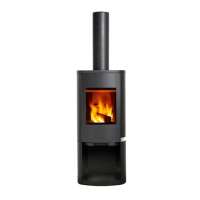7/11/2014 Heat & Glo • 7076-250C 17
Curve 100
6
Maintenance
A. Ash Drawer
(Figure 17.1)
Before attempting any maintenance on the unit ensure
that the unit is cold and has no embers in the fi rebox. To
access the ash drawer open the glass front. The drawer is
located under the fi rebox. Before removing pan empty ash
from fi rebox into the pan.
To do this open the grate at the bottom of the fi repot
using a fi re stoking tool and sliding the top grate counter-
clockwise until all holes are open. Then gently sweep ash
through the grate into the ash drawer below. Then, using
stoking tool again, close the grate so that only the two small
holes in the back of the unit are open.
Then remove the ash pan drawer and empty into
noncombustible container. Never attempt to open ash pan
when stove is lit.
Figure 17.1 Ash Drawer Maintenance
Turn grate counter-clockwise to open all grates.
After all holes open push ash through grates to
drawer below.
Remove drawer by pulling out and empty into
qualifi ed container.
B. Refractory
The fi rebox is lined with molded refractory fi rebrick. The
refractory protects the outside of the appliance and retains
the heat necessary for a clean effi cient burn. The material
is a porous ceramic material that can break from abuse.
Occasionally, surface cracks may propagate from normal
use through the heating and cooling cycle. Surface cracks
are normal and should only be a concern when the crack
causes the refractory to not remain in place on its own.
C. Baffl e Material
There are two baffl e plates in the top of the unit. The
purpose of these plates is to restrict and direct the
combustion gases to allow for complete combustion of the
gasses prior to exiting the fi rebox and entering the fl ue.
The lower baffl e plate is supported on the sides by two
steel pins and in the rear by resting on the back refractory
panel.
The upper baffl e panel is supported by two brackets, one
on each side of the top of the fi rebox. During annual
chimney maintenance, these two baffl e panels must be
removed prior to sweeping. Not doing so will result in
broken panels. Similar to the refractory panels lining the
inside of the fi rebox, the baffl e panels are subject to wear
and tear and are subject to warranty limitations.
D. Proper Burn
Remove ash from fi rebox and ash pan regularly to
ensure proper air supply
Use only 1-3 pieces of wood quartered and placed
to optimize air fl ow
Adjust the upper air control to ensure that enough
air is being supplied to the fi rebox, there should
always be a visible fl ame with minimal smoke
Fuel should never be stacked above the upper air
inlets
E. Coated Surfaces
To clean the stove dust with a lint-free cloth or cleaning
device. If the topcoat is damaged it is possible to purchase
a repair spray from your local dealer. It is possible that this
spray may be slightly different from the original coat. For
best results, use repair spray in wide area in order to create
a subtle transition from one color to the next. For safety
purposes apply spray when stove is cold, the difference in
color may be very noticeable when fi rst applied. However,
after fi ring again it should match very close to original color.
F. Cleaning the Glass
This stove is designed to minimized soot build-up. To
attain this the stove must be burned properly, see section
For Proper Burn. However even when burned properly a
slight buildup of soot can occur. To clean you can use dry
cloth and regular glass cleaner or specialized stove glass
cleaning products.

